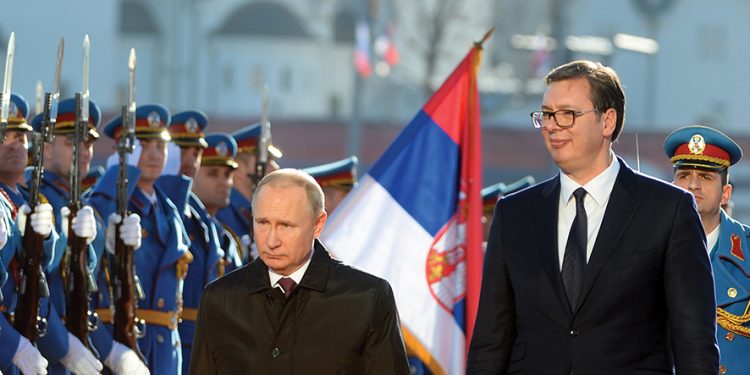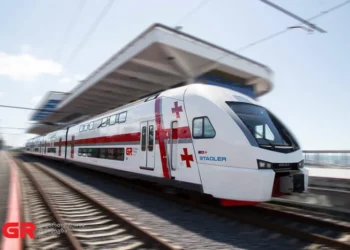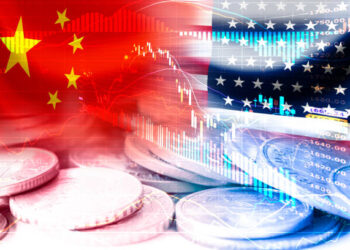Similar to most of Russia’s immediate neighbors which enjoy close ties with Moscow, Serbia benefited economically from the Western sanctions imposed on Russia in the wake of the outbreak of the war in Ukraine in 2022. Numerous Russian businesses relocated to Serbia, and as a result of Moscow’s efforts to re-orient trade from the West, bilateral commercial and energy relations with Belgrade expanded.
The two countries have traditionally had close historic ties. Following February 2022, Serbia refused to impose sanctions on Russia, despite explicit calls from Brussels to do so. The two countries maintain close military cooperation and support each other on various international forums.
For Russia, the relations with Serbia remain a cornerstone of Moscow’s Balkan foreign policy. It allows Russia to project its influence toward the Mediterranean and undermine the EU’s position. Built on historically close ties from before World War I, Serbia and Russia see each other as close partners. Yet, Belgrade is balancing between Moscow and the West. It is unlikely to sacrifice its relations with the EU and is rather cleverly using the Russian card to advance its interests. Serbia wants to build a multi-aligned foreign policy whereby there will be no major fixation on any single actor. It essentially pursues what is increasingly visible in the Middle East where Turkey, UAE and Saudi Arabia are trying to build closer links with as many big actors as possible.
Therefore, for Serbia, the links with the EU will remain of paramount importance. Indeed, economic ties push Belgrade to seek integration into the Union whereas trade and investment relations with Russia are not as significant as it might seem. For instance, commercial ties between Russia and Serbia have been steadily growing over the past several years, and in 2022 grew by 53%, or by $1.5 billion, amounting to $4.28 billion. This is nearly $1 billion more than what was registered in 2021 and is the highest recorded volume since 2008. Among Serbia’s five largest trading partners, trade with Russia has grown the most. At the same time, the growth of Russian exports to Serbia in 2022 was even higher – 70%.
Yet Russia is not Serbia’s biggest trading partner. In the period of January-November 2022, the biggest partner was the European Union: exports to the EU countries amounted to almost $17 billion, imports – almost $20 billion. Trade with the entire EU accounts for 59% of Serbia’s overall trade. Among individual countries, Germany was the biggest trade partner with a trade turnover of $7.9 billion. During 2022, the cumulative exports from Serbia amounted to $29 billion. Russia had a share of only 4.11%, equaling $1.19 billion.
For Russian investors in Serbia, favorable conditions exist, such as exemption for 10 years from paying income tax for large investments, and for 5 years for investments in selected regions of Serbia. A tax credit is provided for fixed assets, reaching up to 80% of the total amount of cash investments. Moreover, imported Russian equipment is not subject to customs duties.
Overall, as of December 2022, Serbia has been able to receive almost $5 billion in foreign direct investment, which is nearly $1 billion more than in 2021. Except for trade in the energy sector, Russia’s role in the Serbian economy is less visible, as Russian investment accounted for only 4.5% of total foreign investment between 2010 and 2020.
Following the war in Ukraine, throughout 2022, almost 200,000 Russians moved to Serbia. Russians established 2321 small companies, while in 2021 their number was only 158. The main cities where the Russian-speaking communities have been formed are Belgrade and Novi Sad.
In the longer run, Serbia will continue to abstain from imposing sanctions on Moscow. Reasons vary, but the pragmatic approach dictates that such a decision would be a painful blow not so much for Russian business, but for the energy sector of Serbia itself. The country might face unprecedented crisis, as the gas transportation system and the operation of some power plants could be suspended. The fuel retail industry too will be impacted, and Russian analysts and politicians believe that it would further weaken Serbia’s position vis-à-vis Brussels, making the latter more vulnerable in negotiations over the future of Kosovo. Nevertheless, Serbia will pusue its multi-aligned foreign policy where its relations with the EU will occupy an important place.
By Emil Avdaliani
Emil Avdaliani is a professor at European University and the Director of Middle East Studies at the Georgian think-tank, Geocase.














